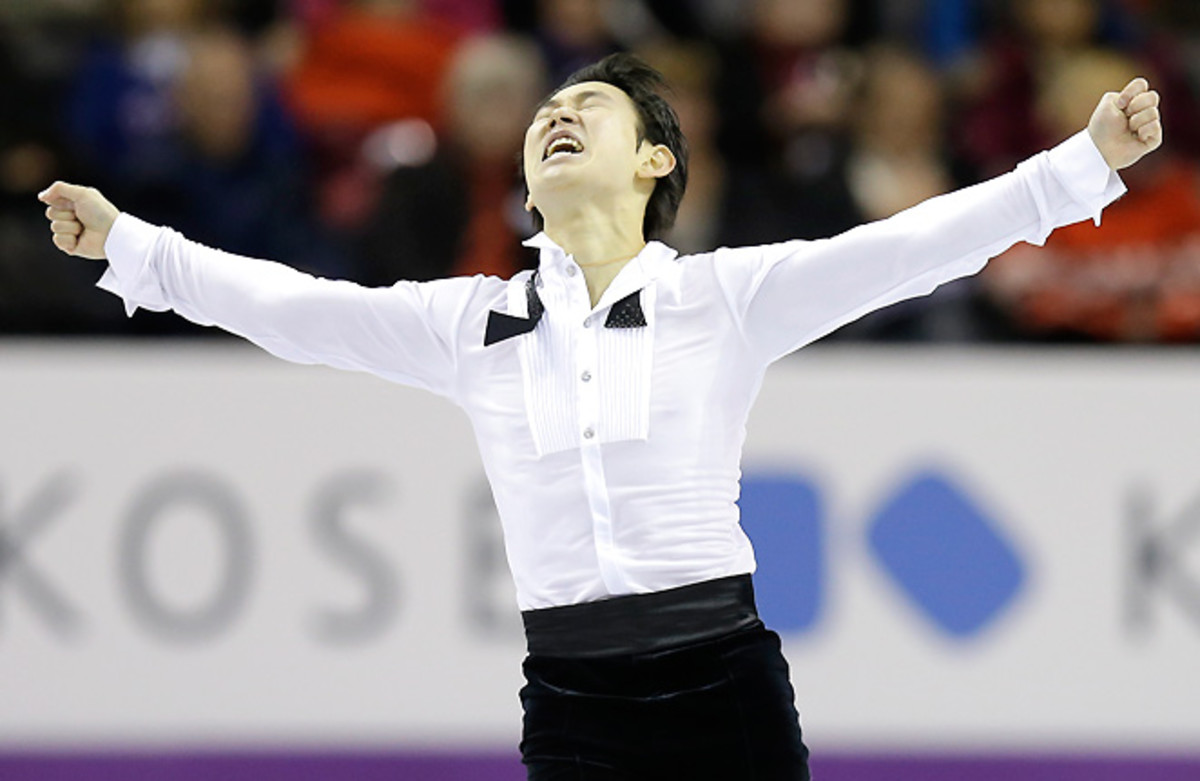Kim Yu-na and Denis Ten dazzle at figure skating worlds
Figure Skating
With her victory at the World Figure Skating Championships in London, Ont., South Korea's Kim Yu-na not only proved that she could come back, but she also re-established herself as perhaps the most dominant athlete in an individual winter Olympic sport. Her margin of victory at worlds was 20.42 points, the largest gap since the ISU adopted the current system of scoring in 2004. (Kim had won the Olympics in Vancouver by a margin of 18.34.)
"She is in another world right now," said Carolina Kostner, the Italian silver medalist. And Kostner wasn't just a weak entrant bringing up the rear; she was the world champion in 2012, when Kim was still on her break from figure skating. To look at it another way, Kim's winning margin in London was greater than the point differential between Kostner and China's Li Zijun in seventh place. Granted its status as a sport entails that it be judged, an appreciation for it demands more than quantification. The aesthetic is harder to define.
"The thing about Kim," U.S. national champ Ashley Wagner says, "is that she has this ability to tell a story and take you with her. It's so clean from start to finish."
On the men's side, the quad jump proved to be the currency for male skaters. The 24 skaters who reached the final group in London attempted a total of 30 quads, including 11 in combination. Three skaters -- Spain's Javier Fernandez, France's Brian Joubert and Canada's Kevin McReynolds -- had three of them built into their programs, though nobody landed all three successfully. The top ten finishers all attempted quads; Germany's Peters Liebers, the 11th place finisher, did not.
Kazakhstan's Denis Ten, who won the free program at Worlds, is now considered a threat to take gold in Sochi, especially if Canada's Patrick Chan, the world champ and Olympic favorite, falters again like he did at the end of his long program. If he won in Sochi, Ten would only be the second Kazakh to capture gold at the Winter Games; Vladimir Smirnov, a product of the old Soviet sports system, won the 50-kilometer cross-country ski event as a 30-year old in Lillehammer in 1994, and also took silvers in the 10k and 15k. In all, the country has also won three silver medals and two bronzes, with four of the six medals coming in cross-country events, one in biathlon and the other in speed skating. If Smirnov seems like a good name for drinkers, he now runs a brewery in Sundsvall, Sweden.
Not only were world medals up for grabs in London, but so were qualification places in Sochi. The following countries qualified the maximum number of three entries in the specified disciplines to the 2014 Games: U.S. (women, ice dance), Canada (men, pairs, ice dance), Japan (men, women), Russia (pairs, ice dance), South Korea (women).
Alpine Skiing
Ted Ligety clinched the World Cup giant slalom discipline title with his sixth victory of the season in Kranska Gora, Slovenia. He became the third skier, behind legendary Swede Ingemar Stenmark in 1978-79 and U.S. star Phil Mahre in 1981-82 to reach the podium in every GS race of the season. In addition to his giant slalom title, Ligety took third in the overall World Cup standings behind Austria's Marcel Hirscher and Norway's Aksel Lund Svindal.
For the women, Lindsey Vonn may have been home recovering from knee surgery and waxing about her famous boyfriend instead of waxing her skis, but Vonn was also assured of the World Cup season's downhill crown when the final race of the season was canceled due to inclement weather. Rising U.S. star Mikaela Shiffrin claimed the slalom title, and Julia Mancuso finished fourth overall and second in the super-G.
Boxing
Olympic boxing won't quite have a facelift, but it will have a head guard lift at the next Olympics. AIBA, the international federation that oversees amateur boxing, announced this week that it would no longer require male boxers to wear the headguards that were first made mandatory at the 1984 Olympics in Los Angeles. AIBA said it based its decision on its own research and an independent group of physicians who analyzed nearly 30,000 international bouts over the past half-century. Although junior male boxers and all female boxers will still be required to wear headgear in international competition, the elite males will compete without them for the first time at the World Boxing Championships in Almaty, Kazakhstan starting on Oct. 4.
Gymnastics
It may a while before we see gray hair again on a gymnastics mat now that Jordan Jovtchev officially celebrated his retirement over the weekend. Jovtchev, whose appearance at the London Olympics was the sixth of the Bulgarian's remarkable career, hung up his straps at age 40. More than 12,000 people showed up at the Arena Armeec Sporthall in the capital city of Sofia for the salute to Jovtchev that included musicians, dancers, domestic and international gymnasts and performances by Jovtchev, himself. His former teammates tossed him in the air and carried him around the floor near the end of the evening. In London, Jovtchev placed a very respectable eighth on the still rings, the apparatus he won twice at the world championships. In his lengthy career, he won four Olympic medals -- a silver and three bronzes -- and 13 world medals, including four golds. Even as an active athlete, he has served as president of the Bulgarian Gymnastics Federation since 2009.






